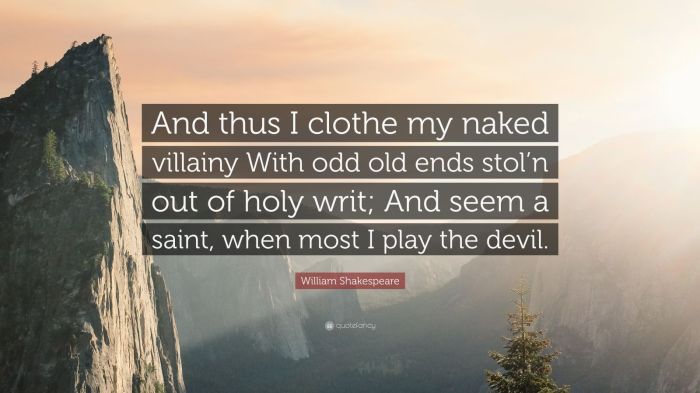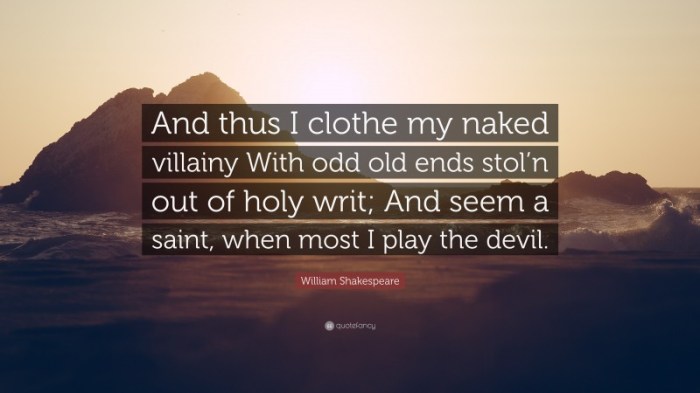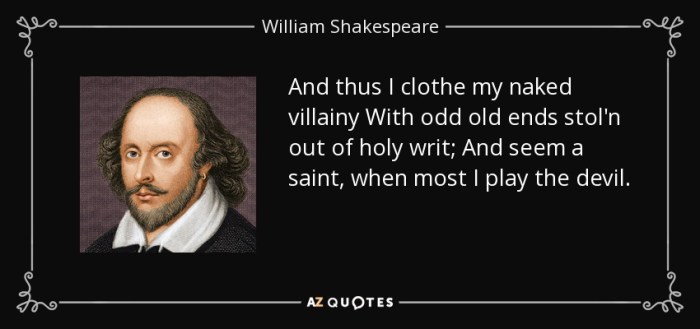As “And Thus I Clothe My Villainy” takes center stage, this opening passage beckons readers into a world crafted with expertise, ensuring a reading experience that is both absorbing and distinctly original.
This exploration delves into the origins and significance of the phrase within Shakespeare’s “Othello,” examining its role in unraveling the depths of Iago’s cunning and treachery.
Introduction: And Thus I Clothe My Villainy

The phrase “and thus I clothe my villainy” appears in William Shakespeare’s play “Othello,” spoken by the character Iago. It encapsulates Iago’s cunning and manipulative nature, revealing his ability to conceal his malicious intentions beneath a facade of innocence and loyalty.
Within the context of the play, Iago is a trusted advisor to Othello, the Moorish general. However, Iago harbors a deep-seated resentment towards Othello, driven by jealousy and a desire for revenge. He devises an elaborate scheme to destroy Othello, manipulating events and planting seeds of doubt in Othello’s mind, ultimately leading to the tragic downfall of both Othello and his beloved wife, Desdemona.
Significance of the Phrase
The phrase “and thus I clothe my villainy” serves as a key insight into Iago’s character. It demonstrates his ability to deceive and manipulate others, presenting himself as a loyal and trustworthy friend while secretly plotting their downfall. Iago’s use of the word “clothe” suggests that he is intentionally concealing his true nature, covering up his malicious intentions with a veneer of innocence.
The phrase also highlights Iago’s self-awareness and cunning. He is fully aware of his own villainy and takes pride in his ability to deceive others. He revels in the power and control that his deception gives him, enjoying the chaos and destruction that he orchestrates.
Furthermore, the phrase foreshadows the tragic consequences of Iago’s actions. By “clothing” his villainy, Iago sets in motion a chain of events that will ultimately lead to his own downfall and the destruction of those around him.
Iago’s Villainy
Iago, the cunning and manipulative villain of Shakespeare’s “Othello,” demonstrates his villainy through a myriad of tactics. His actions, driven by a complex web of motivations, serve as a chilling reminder of the destructive power of envy and malice.
Motivations Behind Iago’s Actions
Iago’s villainy stems from a confluence of motivations. Primarily, he is driven by a deep-seated envy of Othello, whose promotion over him fuels his resentment. Additionally, he harbors an unrequited love for Desdemona, Othello’s wife, which further exacerbates his hatred.
Manipulative and Deceptive Tactics
Iago employs a range of manipulative and deceptive tactics to achieve his sinister goals. He is a master of deception, using lies and half-truths to sow seeds of doubt and mistrust among Othello and his trusted friends. Through skillful manipulation, he plays upon their vulnerabilities and insecurities, driving them to act against their own interests.
- Planting Seeds of Doubt:Iago subtly insinuates suspicions about Desdemona’s fidelity, using vague hints and suggestive language to poison Othello’s mind.
- Exploiting Vulnerabilities:He identifies and exploits Othello’s insecurities about his race and Desdemona’s perceived infidelity, using them as leverage to fuel his jealousy.
- Manipulation of Events:Iago orchestrates events to create the illusion of Desdemona’s guilt, using fabricated evidence and carefully planned confrontations to deceive Othello.
Consequences of Iago’s Villainy
Iago’s villainy has devastating consequences for Othello and his loved ones. Othello’s trust is shattered, leading to the tragic deaths of Desdemona and himself. Iago’s actions expose the fragility of human relationships and the destructive power of jealousy and manipulation.
The Role of Language

Iago’s villainy is intricately intertwined with his mastery of language. He wields words like a double-edged sword, manipulating and deceiving others while concealing his true nature.
Iago’s language is often characterized by its ambiguity and duplicity. He employs insinuations, half-truths, and outright lies to sow seeds of doubt and suspicion in the minds of his victims. By carefully crafting his speech, he can subtly influence the perceptions of others, leading them down a path of self-destruction.
Manipulation and Deception
Iago’s ability to manipulate and deceive others through language is evident in his interactions with Othello. By planting seeds of doubt about Desdemona’s fidelity, Iago skillfully exploits Othello’s insecurities and jealousy. He uses suggestive language and fabricated evidence to create a web of suspicion that ultimately drives Othello to madness and murder.
Revealing His True Nature
Iago’s soliloquies provide a glimpse into his true nature, revealing his cynical and manipulative mindset. In these private moments, he unveils his contempt for others and his delight in their suffering. Through his soliloquies, Iago exposes the inner workings of a villainous mind, driven by a desire for power and control.
Thematic Connections

Iago’s villainy is intricately interwoven with the play’s central themes of jealousy, betrayal, and revenge. His manipulative actions fuel the tragic events that unfold, highlighting the destructive consequences of these emotions.
Jealousy and Betrayal
- Iago’s envy of Cassio and Othello leads him to devise a plot to ruin them. His lies and manipulations create a climate of suspicion and mistrust, ultimately driving Othello to kill Desdemona.
- The betrayal of trust is a recurring motif throughout the play. Iago’s treachery towards Othello, his closest friend, is a chilling example of the devastating effects of betrayal.
Revenge, And thus i clothe my villainy
Iago’s desire for revenge is a driving force behind his actions. His manipulation of Othello is motivated by a twisted sense of justice, as he seeks to avenge his perceived slights against him.
Darker Aspects of Human Nature
Iago’s villainy exposes the darker aspects of human nature. His cunning, deceit, and lack of empathy reveal the capacity for evil that exists within individuals.
Critical Perspectives

Iago’s character and villainy have been the subject of extensive critical analysis, resulting in diverse interpretations. These interpretations have evolved over time, reflecting shifting cultural and literary sensibilities.
Initially, Iago was viewed as a purely evil figure, a personification of human wickedness. However, as literary criticism evolved, more nuanced interpretations emerged.
Psychoanalytic Perspective
Psychoanalytic critics have examined Iago’s motives through the lens of unconscious desires and conflicts. They suggest that Iago’s villainy stems from repressed sexual desires, envy of Othello, and a deep-seated need for control.
And thus I clothe my villainy with a semblance of innocence. To further enhance my deception, I must expand my vocabulary. The vocab book level f answers will provide me with the necessary words to craft my lies with precision.
With this newfound knowledge, I shall continue to deceive, my villainy hidden behind a facade of innocence.
Strengths:Provides a complex psychological portrait of Iago, exploring the hidden motivations behind his actions.
Weaknesses:Can be overly speculative and may not fully account for the social and historical context of the play.
Sociocultural Perspective
Sociocultural critics focus on the influence of social and cultural factors on Iago’s behavior. They argue that his villainy is a product of the Venetian society in which he lives, with its emphasis on competition, ambition, and racial prejudice.
Strengths:Places Iago’s actions within a broader social and historical context, providing a deeper understanding of his motivations.
Weaknesses:May downplay the individual agency of Iago, attributing his actions solely to external factors.
Postcolonial Perspective
Postcolonial critics examine Iago’s villainy through the lens of race and colonialism. They argue that Iago’s hatred of Othello is driven by his own internalized racism and a desire to maintain white supremacy.
Strengths:Highlights the role of race and colonialism in shaping Iago’s character and actions.
Weaknesses:Can be overly simplistic and may not fully consider the complexity of Iago’s motivations.
Modern Adaptations
Iago’s character has been subject to numerous adaptations in modern productions of Othello. These adaptations have updated or reinterpreted his villainy in various ways, shedding new light on the character and his motivations.
Shakespeare Reimagined: Contemporary Adaptations
Modern adaptations of Othello often transpose the play’s setting to contemporary times, exploring how Iago’s villainy manifests in the present day. For example, in the 2001 film O, directed by Tim Blake Nelson, Iago is a manipulative corporate executive who uses his position to orchestrate Othello’s downfall.
Iago as a Product of Society
Some adaptations emphasize the societal factors that contribute to Iago’s villainy. For instance, in the 2018 play Iago by Kwame Kwei-Armah, Iago’s motivations are rooted in his experiences of racism and discrimination.
Exploring Iago’s Psychology
Modern adaptations have also delved into the psychological complexities of Iago’s character. In the 2016 film Othello, directed by Antoine Fuqua, Iago is portrayed as a sociopath, whose actions are driven by a deep-seated need for control and domination.
Impact on Understanding the Character
These modern adaptations have significantly impacted our understanding of Iago’s character. By updating or reimagining his villainy, they have challenged traditional interpretations and provided new insights into his motivations and actions.
Questions and Answers
What is the significance of the phrase “And Thus I Clothe My Villainy”?
It reveals Iago’s self-awareness of his deceptive nature and his intention to conceal his true intentions.
How does Iago’s language contribute to his villainy?
He uses manipulative and deceptive language to sow seeds of doubt and mistrust among others.
What are the motivations behind Iago’s actions?
His motivations remain ambiguous, but may include jealousy, a desire for power, or a twisted sense of amusement.